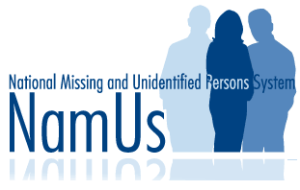Fair Warning: This post discusses unidentified corpses, so if you don’t want to think about death and missing persons, click away right now.
 As a private investigator, on the very first missing persons search I worked on, I found that the individual was deceased. I hated to tell my client that her long lost buddy was dead, but at least it was closure; the client knew what happened to her friend. I am haunted by another case in which I could find no clue about what happened to a missing young woman who had a history of drugs and prostitution.
As a private investigator, on the very first missing persons search I worked on, I found that the individual was deceased. I hated to tell my client that her long lost buddy was dead, but at least it was closure; the client knew what happened to her friend. I am haunted by another case in which I could find no clue about what happened to a missing young woman who had a history of drugs and prostitution.
I cannot imagine the torture of having a loved one simply vanish and not knowing for years, possibly forever, about what happened to that person. I am so fascinated by this subject that I have now written about missing persons three times. In my novel Endangered, a toddler vanishes from a campground in a national park and the media coverage cause many to assume a cougar took him. In The Only Witness, an infant disappears from a locked car and half the town suspect the teen mom murdered her daughter. And in The Only Clue, the police force of my fictional small town of Evansburg, Washington have been notified about the disappearance of an adult schizophrenic, but they are not actively investigating the case, as is often true when addicts and mentally ill adults go missing.
Most missing individuals are either found reasonably quickly or never located. That’s because the case of a missing person is quickly moved to the back burner by law enforcement, especially when the missing person is an adult. The police have limited time and budgets to solve all crimes, it’s difficult to track possibilities through multiple jurisdictions, and often a missing person case has very few clues to follow. But each passing day is another 24 hours of torture for the families of the missing.
So when I heard a former law enforcement officer who is now an author mention the NamUs database (“Name Us”), I immediately reached for my pen and notebook. Have I been living under a rock? I’d never heard of NamUs. The authorities and the media have done a really crappy job of making this resource known to the public.
Namus is a nationwide database available for free to the public to help both families and law enforcement personnel identify the 40,000 unidentified corpses who have been found in the United States. (Yes, you read that right–forty thousand!) NamUs also contains names and details of deceased people who were identified but whose bodies were never claimed. (I can see how this could happen, because I’ve worked on a few cases where an individual was known to be homeless but hadn’t been heard from for decades and remaining family members had different last names and scattered, sometimes across multiple countries.)
 I know there are a lot of families in which loved ones vanished so long ago that remaining members may be totally unaware of this new resource. Family members can enter descriptions and last-seen details of their missing loved ones, which may then be matched up with unidentified remains. DNA can be submitted in cases where that might help.
I know there are a lot of families in which loved ones vanished so long ago that remaining members may be totally unaware of this new resource. Family members can enter descriptions and last-seen details of their missing loved ones, which may then be matched up with unidentified remains. DNA can be submitted in cases where that might help.
Are you missing a family member or a friend? It may not contain the answer you’re hoping for, but NamUs could bring some closure to your case. It’s a great tool that anyone searching for a missing person should know about.
I’m so pleased you put this website on your blog. I hope it will help someone find a long lost relative or loved one. Thank you
dear pam,
I was put up for adoption in medellin columbia in 1971. I was adopted by two amazing people on their first post for the u.S. foreign service. All I was told is my mother was young and was sent to Bogota to hide the pregnancy. On Dec.3rd 1971 my mothers parents told her I died at birth her parents put me up for adoption in medellin and at 4 days old was adopted.Please help me to find my mother .
sincerely
Marc wilson
It’s very difficult (and may be illegal) for an American PI to get information from other countries; this would probably need to involve a Colombian investigator. A good place to start is–how do you know that your mother’s parents told her you died at birth? Whoever is telling you that surely knows who your mother is. I wish you the best of luck!